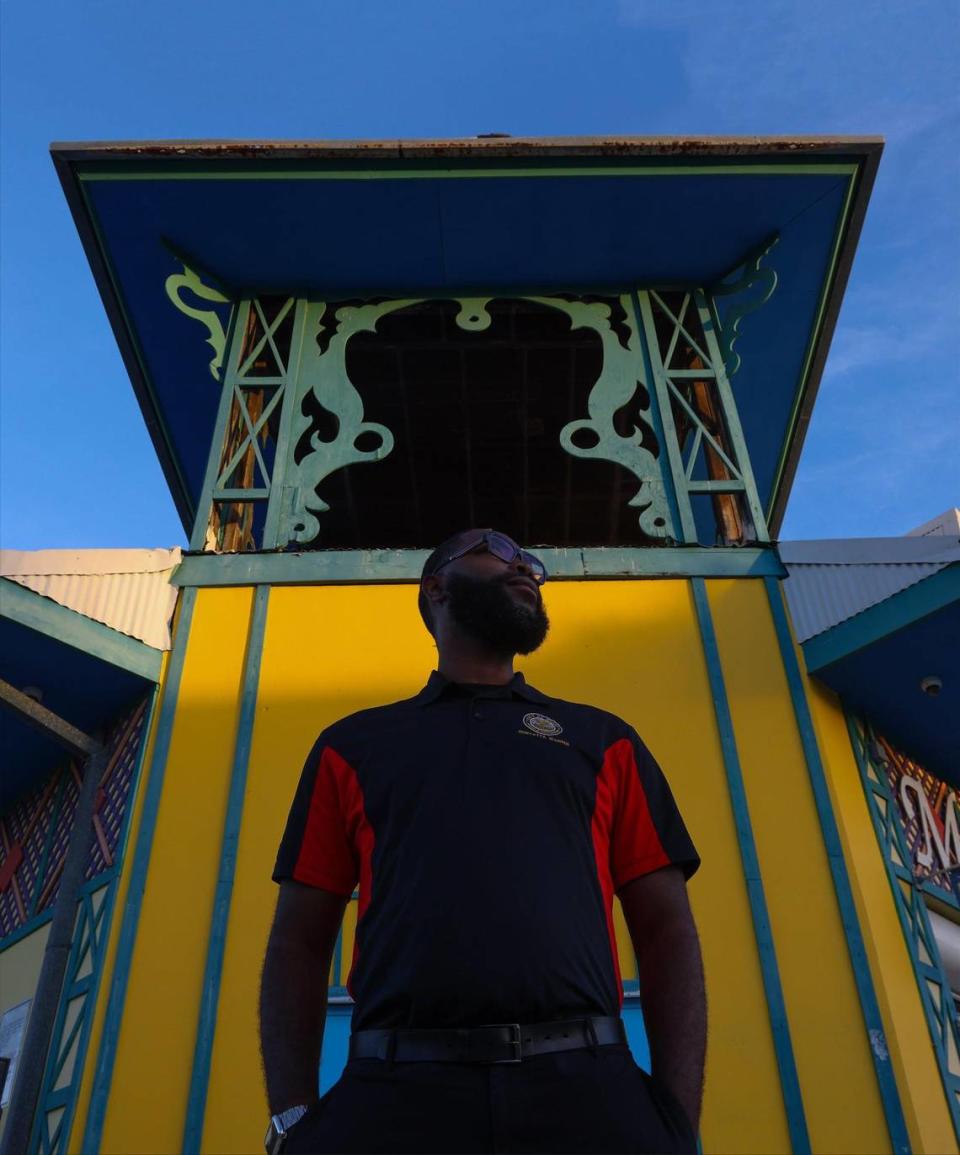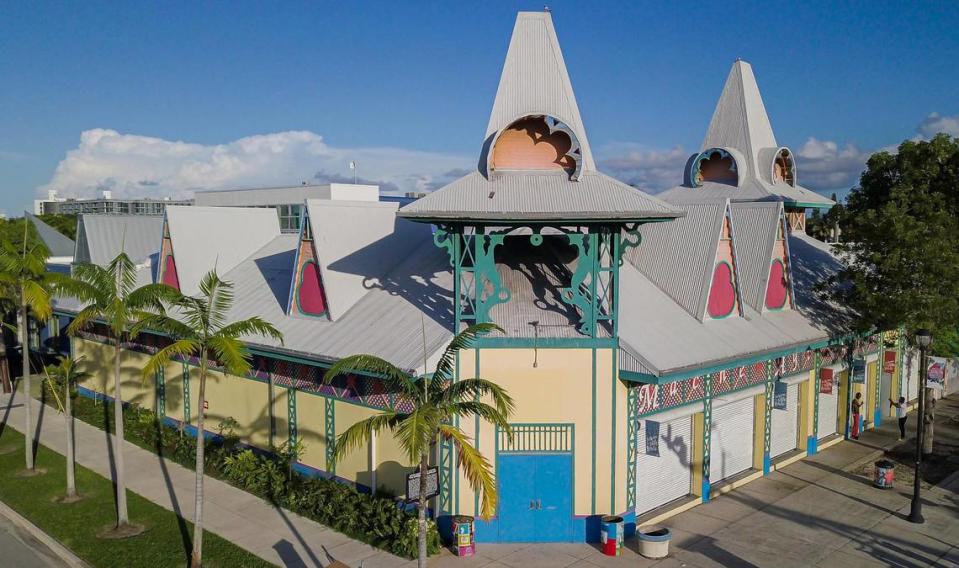As Little Haiti continues to change, its cultural center gets a new leader
The very first thing Qunyatta Warren did as the new executive director of the Little Haiti Cultural Complex was create a list.
He wanted to know the problems with the facility. He wanted to know the best programming for the community. He wanted to know the type of training his staff needed. Ultimately, he just wanted to know what he got himself into.
“Ultimately, my vision for the center is to be a place for the African diaspora to have events and programming, to be a place where we can just...,” the 11-year U.S. Army Reservist said, his voice momentarily trailing off, “... be.”
Since late June, Warren has led the Little Haiti Cultural Complex, a bastion within the eponymous neighborhood that includes the Little Haiti Cultural Center and adjoining Caribbean Marketplace. The complex features an art gallery, theater, studios and classrooms where residents can engage in any number of activities ranging from dance classes to taekwondo to shopping. Warren’s aims are clear – “leading the facility, providing the best possible programming and getting this facility to the standard of every cultural and performing arts center in South Florida,” he said — yet the St. Petersburg, Florida native has his work cut out for him.

Warren “really is fresh and he has a bunch of great ideas and he wants to get the place going,” said Fayola Nicaisse, former chair of the Little Haiti Revitalization Trust and the founder of natural beauty products line Ebene. “He’s doing everything he can to move things forward but a lot of stuff that happened before he got here will make his job a challenge.”
Warren is taking the helm at a time when the gentrification that is creeping into Little Haiti is making even the center itself seem like prime real estate for redevelopment. Then there’s a perception in the area that the city wants the center closed that has been lingering for decades. It erupted again in the past year when the city gave the Caribbean Marketplace an “unsafe structure” notification. Finally, Warren says the lack of funding that the LHCC receives will make it a challenge to get the center on the right track.
‘The heartbeat of Little Haiti’
Built to resemble the famous bazaar in Port-au-Prince known as the “Iron Market,” the Caribbean Marketplace hoped to drive economic opportunity to the neighborhood’s Haitian community when it first opened in 1990. It represented hope in an area that received an influx Haitians fleeing the unrest of their homeland in the 1970s and 1980s. When the city took control of the marketplace in 2005, a year before the adjoining culture center opened, elected officials planned to demolish it until local activists voiced their opposition.

By the time Little Haiti officially established its boundaries in 2016, the neighborhood was already being bought up by developers who had been after the area’s cheap land and high elevation. As many younger Haitians moved away, the ones who stayed fielded incessant solicitation from investors. Prices began to rise, rents began to rise and residents began to voice their concerns as longtime small business owners and neighbors alike were pushed out.
Then the controversial $1 billion Magic City Innovation District plan passed in 2019. The 18-acre mixed-use development along Northeast 62nd Street allows buildings as tall as 25 stories in an immigrant enclave where many homes have only two. The project only further cemented locals’ fears their neighborhood was slipping out of their hands. Between 2000 and 2020, the percentage of Haitians inside the neighborhood dropped nearly a third, according to the latest Census data. More land grabs would soon follow, most notably the December 2022 purchase of 20 properties along the Northeast Second Avenue, Little Haiti’s main commercial corridor.
As the neighborhood continues to change, the future of the LHCC is in a precarious position. Will it be a place for the Haitian diaspora to continue to celebrate its culture? Or will it be absorbed by the new communities moving into the area?
“I don’t have a problem with the community demographics changing; I welcome a melting pot,” Nicaisse said. What she does consider a problem is that the very people who built Little Haiti cannot afford to live there. “Little Haiti Cultural Complex is the heartbeat of Little Haiti. When I go to Little Havana, I feel that I am surrounded by the culture of that area and that’s what I envision for Little Haiti as well.”
Other community members are not optimistic.
“Little Haiti is dying slowly,” said Jean-Marie “Jan Mapou” Denis, a writer and longtime owner of the neighborhood institution Libreri Mapou.
Denis moved to Miami in 1984. From the comfort of his bookstore, which adjoins the Caribbean Marketplace, he recalls the golden days of Little Haiti, his Haitian Book Fair and the importance of preserving Haitian culture. Then he shares some intel.

“They offered me over $1 million to buy my building because they want the whole section,” he said, referring to developers wanting to purchase the strip of Northeast Second Avenue between 59th Street and 59th Terrace that includes Libreri Mapou and the Caribbean Marketplace.
Denis says he would never sell — “It’s my legacy to my community” — yet the amount of Haitians who cannot afford to live or work in the neighborhood they created underscores the importance of the LHCC.
“That’s why we need the Caribbean Marketplace: to create foot traffic with tourism and Haitian vendors selling arts and crafts,” Denis said. “This will bring people. This will bring tourists.”
And regardless of who’s at the head of the LHCC, the person must make an effort to connect with the community’s leaders, says Denis.
“The Haitians who gave their life, who fought for those two buildings,” Denis said, “[Warren] cannot ignore them.”
‘Support was always lacking’
The first thing Warren noticed when he took over the LHCC was a funding issue.
“It’s difficult when you want to bring programming but your budget won’t allow you to do that,” said Warren, who wants to double the amount of dance classes from four to eight. “It’s challenging and I’m just trying to figure out other creative ways to bring programming to the center.”
Warren pointed to the African Heritage Cultural Arts Center as an example. Housed in a Miami-Dade County-owned building, the AHCAC will receive about $4.3 million for the 2023-24 budget year. Requests to the city for information about the LHCC’s annual budget went unfulfilled. Warren posited his budget — for both the Caribbean Marketplace and the LHCC — to be $1.3 million, roughly $130,000 of which goes to programming.
“The financial support, the professional support was always lacking,” said Sandy Dorsainvil, who served as the LHCC director at various times since 2013. Known for bringing events to the LHCC, Dorsainvil was fired in 2022 after the city claimed she agreed to an advertising contract without its approval. Dorsainvil admitted to signing the document yet said she did so due to the LHCC’s lack of staff. “To this day, the culture center is still understaffed, still doesn’t have a sufficient marketing budget, still doesn’t have a sufficient programming budget.”
“If the city does want it to be successful, that’s great,” Dorsainvil said, “but the budget doesn’t reflect that.”

The question then becomes what does the city envision. In February, the LHCC received an “unsafe structure” notification from the city which included failure to secure a 40-year recertification and the need for structural repairs, according to WLRN . Essentially the city was calling itself out for not properly maintaining its own property. Members of the community again felt like the city was setting the stage to get rid of the center. Miami Commission Chairwoman Christine King, however, called the violations “procedural.”
“The time had come for the 40-year recertification and many were concerned that ‘Oh, they’re tearing down the cultural center,’ said King, whose district includes Little Haiti. “No. It wasn’t unsafe. It was a procedural notice.”
Regardless of how many different ways she said it, King continued, people still chose to believe that the LHCC was on the verge of closing.
“The culture center isn’t going anywhere,” she added. “The City of Miami is not going to tear it down. We’re doing everything possible to build it up.”
Still, skepticism remains. The abrupt shutdown of the Caribbean Marketplace in 2022 as well as the corresponding halt of many activities at the LHCC after Dorsainvil’s firing has many worried if it can even rebound.
‘All about arts, culture and community’
Warren is undeterred by the issues he inherited. He says he knew about the unsafe structure notification before taking the job but wasn’t concerned as this was his “dream job.”
“I knew it was an issue that we could address together as far as the center and the city, so that wasn’t as big of a deal,” Warren said. “I’d consider being underfunded a bigger deal than that.”
He noted the marketplace’s need for a new roof, a drainage issue that floods the second dance room, leaky windows in the theater and a broken air conditioning unit. The city recently approved $500,000 to replace the unit, according to the city budget. Warren estimated these improvements will cost more than $1 million, though he could not guarantee when the repairs would be completed.

“Before me, I think the issue was them not having a manager here to get some of this stuff pushed or having someone at the center who can advocate for the center and for the staff,” Warren said. “For me, that’s a priority: making sure the center gets the things that it needs to be successful and part of that is having a facility that is standard.”
And that certainly shows. The LHCC’s active Instagram page is the most obvious example, which prior to Warren, was controlled by the city rather than in-house and posted rather infrequently. A revamped website is currently in works.
Social media is “going to be the main channel for us to put stuff out,” Warren said.
Although Warren isn’t from South Florida, he understands the importance of the LHCC. The new Miami resident has Haitian ancestry and has been involved in African drumming classes — both as a student and instructor — since he was a child.
“I started going to the classes and I saw all this exciting African dancing and African drumming,” Warren said, recalling how his older brother exposed him to traditional African culture. “I started drumming at 10 and that led to all things African diaspora: learning more about my history, my heritage and having pride in oneself.”
Warren worked as the director at cultural arts nonprofits like Artz 4 Life Academy in Clearwater, Florida and Kreative Kids and Beyond Inc in Orange Park, Florida, where he handled community engagement, programming and recruitment, among many other things. Later he worked as the dean of students at Performing Arts Charter School in Orange Park.
More than anything, Warren wants the community to know that he’s there for them, saying his door is open to everyone. The LHCC, after all, belongs to Little Haiti. And while Warren might not speak Creole, he vows to have a relationship with the community.
“I don’t think that my ethnicity, my background will affect how I approach programming, how I lead the center,” Warren said. “Once people get to know me and that I generally want what’s best for the community, that’ll change. I’m all about arts, culture and community.”

